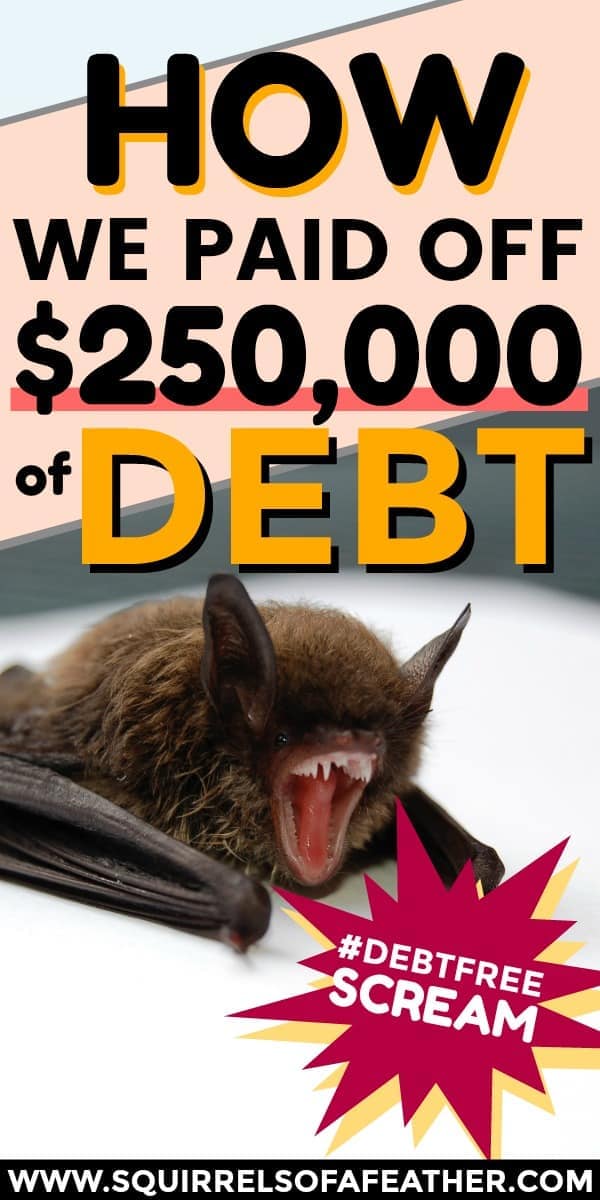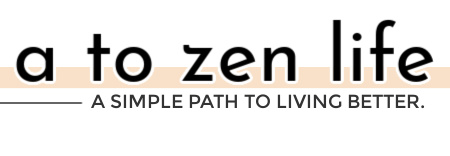How to Pay Off Debt FAST (We Paid Off $250,000 in 5 Years!)
This post may contain affiliate links for your convenience. That means that if you make a purchase, I will receive a small commission at no extra cost to you. Read more here.
You are living paycheck-to-paycheck and up to your eyeballs in debt. You find yourself wondering if it’s even possible to get out of debt, especially the huge amounts you see on your bills and bank statements. Do you sometimes feel like screaming, “What do you WANT FROM ME???” when you try and brainstorm about how to pay off debt?
Sound familiar?
That first paragraph describes my exact feeling after I graduated from college over 10 years ago!
Not only did I find myself staring down $25,000 in student loan debts, but I also had personal debt I owed to people I had to borrow money from just to survive and pay bills.
Add to that the housing debt my husband had when I met him — after purchasing a home right before the 2008 housing market crash and financial crisis — PLUS his car loan debt and in total we had over $250,000 in debt between the two of us before we got married!
So when I tell you how to pay off debt fast, I’m speaking from 100% personal experience when I tell you that it is possible.
As I said, our debt included:
- personal debt
- house debt (a mortgage)
- car loan debt
- around $25,000 in student loan debt
Luckily, both my husband and I fanatically avoided credit card debt, but if you have credit card debt, don’t worry — these debt-payoff tips also work for paying off credit cards!
The key is knowing how to pay the debt off fast even when you don’t have money.
Here I have outlined 15 crucial debt payoff strategies below to help you understand the method we used to help us get out of debt!
Are you ready to get yourself out of debt and realize financial freedom? Then let’s do this!

How do you pay off debt?
No matter your income level or amount of debt, the Number One best way to pay off debt is to have a plan and stick to the plan.
Without a plan, you’ll continue to struggle, because it’s much easier to spend money without worrying about the future than it is to think about every dollar spent.
If you don’t commit to sticking to your plan you are headed for a crash landing.
It’s crucial that you sit down with your partner and come up with a strategic plan that puts both of you on the same page.
This step may not be easy.
Yes, there may be arguments, but it’s worth it in the end. Make sure you have an open mind and listen to each other’s needs/wants and concerns as you work things out.
The bottom line is that you can’t effectively pay off debt if you’re on two different pages.
If one of you works hard to put every penny into paying off the debt while the other is out wasting money, it’s a lose-lose situation. You have to do your research, and create a plan you are both comfortable with.
Finding balance will be key, so you don’t get burned out trying to pay off your debt.
That also means being able to roll with the punches, such as changes in income, during emergency situations, or even when experiencing feelings of burnout.
We always looked at our debt payoff plan like a seesaw — when one side got heavy, we needed to balance it by looking at a different area to compensate, such as saving money on eating out by cooking the same thing cheaper at home!
What if you don’t have money?
You’re probably thinking right now, ‘How will I ever pay off debt like you did when I have no money?’
Here’s a secret – we didn’t have money when we started either!
We started trying to pay off our debt at the worst possible time, following the crazy financial crisis of 2008.
Not only that, but neither my husband nor I had a family to lean on or financial role models that we knew to turn to – everything we learned was through trial and error!
15 best tips to pay off debt fast
The following is a collection of our best debt tips and how we got ourselves out of $250,000 in debt in just five years.
Now, neither of us had ever heard of Dave Ramsey at the time we were paying off debt, but if you are a fan of his you may find some of these debt payoff tips similar.
That’s because they legitimately WORK.
Use the tools as you see fit. Some of these tips will apply to you and some may not.
Please know that none of these tips are meant to shame you about making a purchase you regret or to make you feel bad for your ‘mistakes’
This is a time to reframe your thoughts about money and work toward your goal to pay off debt and realize financial freedom.
1. Set debt payoff goals for yourself
A lot of people feel ashamed of their debt and try to hide it.
They not only hide the fact that they have lots of debt from family and friends, they sometimes even refuse to acknowledge the debt they are carrying themselves.
If you really want to pay off your debt, you need to know EXACTLY how much debt you have, who you owe it to, and even how much interest you are paying on each debt.
Take a pen and paper and jot out all of your debt – you can even create spreadsheets on your computer!
Write down:
- Each type of debt (credit card, student loan, mortgage, car loans, etc)
- How much you owe for each debt
- The interest rates you are paying for each
- Minimum monthly payment amounts
If you are married, do this together – it’s easier to be strong and face debt with someone you love at your side. You also need to work together to pay off the debt, so you need to be on the same page.
Calculating how much debt you have can be super scary — looking at all that money you owe to banks, credit card companies, and elsewhere can feel as terrifying as a kid trying to face the monster under his bed! Be brave and believe in yourself.

2. Learn how to budget
I know, to some people budget is a ‘dirty word’.
It probably sends shivers down your spine because to you, budgeting means ‘restriction’ or ‘sacrifice’ right?
Wrong.
A budget is a roadmap for your money; it gives you and your money direction. A budget will help you spend less and get out of debt faster. You NEED a budget if you want to pay off debt fast as we did.
While there are HUNDREDS of budgeting programs out there, you can do it with just a pen and paper.
If you do decide you want/need a fancy program, please opt for a free program, like Mint.
At this point, you don’t need to spend money to track your money. You can worry about that later when you have way too much money to keep track of yourself — I mean, #lifegoals, amirite?
You’ll take baby steps here because you want this to be a life skill, not a quick trend.
Don’t forget to give yourself grace during this step. Life happens and so do mistakes. That doesn’t mean your plan is foiled.
Learn from your mistakes, pick up the pieces, and move on – you’ll be a better person after learning from your mishaps.
3. Track how much you spend every month
I know we talked about this in the budgeting section, but it’s worth mentioning again.
Tracking your expenses each month is crucial. You’ll see where you are spending that you shouldn’t and you’ll also see areas you can negotiate that you may have overlooked before.
Don’t cheat yourself — be honest!
Write down every penny that you spend into the right category and decide if it was a necessary expense.
If it wasn’t, try to figure out why you spent it and fix the issue.
This step isn’t meant to shame you or make you feel bad. It’s simply a way to keep you on track. We can all spend money without even realizing it.
Track every penny – you’ll be glad you did.
✨ NEW!✨ GRAB YOUR FREE PRINTABLE BUDGET PLANNER!
4. Start a spending freeze
This sounds drastic, but it’s a great idea, at least when you first start trying to pay off debt. You can save a bunch of money fast!
In a spending freeze, you don’t spend a dime that isn’t necessary.
Of course, you still pay your bills, feed your family, and take care of any medical necessities, but that’s it.
A spending freeze means:
- No more coffee shop stops
- No more shopping sprees
- No eating out
- No going to the movies and chowing down on expensive snacks
Everyone’s spending freeze will look different because we all have different essential needs. The key is to stick to it and be honest about what’s essential.
How to start a spending freeze
- Set a dedicated timeframe for your spending freeze. On your first spending freeze, you may want to try for a week or two and see how you do.
- Stop buying things! Are you someone who can’t help spending money when they go to Target or buying a coffee when working term paper at Starbucks? Then don’t go! If you have trouble with spending, just stay out of situations that cause you to spend money.
- Track your progress. As you see it working, you’ll be motivated to keep going. If you find yourself breaking the spending freeze and spending money make sure to write about WHY you spent the money? (Start noticing the triggers that make you want to spend money, like a stressful day at work or a fight with your husband.)
Here’s another tip: don’t keep your spending freeze a secret! Tell the world. You want everyone to know so they don’t tempt you to spend.
When your best friend calls and wants to go for coffee, it’s easier to say ‘remember my spending freeze’ rather than explaining it for the first time.
5. Refinance anything you can
If it makes sense for your long-term goals, you can refinance your debt.
There are many debts this works for, but mainly your house. Now is a GREAT time to do this because interest rates are low and mortgage companies aren’t crazy busy. You’ll get the attention you need and the rates you desire.
When you refinance your home, remember, you’re doing it strictly to lower your payment.
The goal is to get a lower rate.
Don’t make the mistake of extending your term in exchange for a lower payment.
Yes, the payment can be enticing, but think about this – if you refinance into a longer-term plan (say you had a 20-year term and you extend it to 30-years) that’s 10 more years to get out of that debt.
That means thousands of dollars in interest that you could have saved!
It also makes it more tempting to make just the minimum payment rather than paying extra to pay off debt.
You may also be eligible to refinance or even cancel student loans — more on that below!
6. Consolidate or cancel student loan debt
In my case, I was able to cancel a part of my student loans as a healthcare worker.
Not everyone will be eligible to cancel their loans, but there are other options. If you have federal student loans, check out what’s available to you by visiting the U.S. Department of Education’s website.
There are likely many more options for forgiveness or aid than you thought.
Here are a few examples:
- Public Service Loan Forgiveness – If you work in the public service sector, you may have a portion of your loans forgiven
- Teacher Loan Forgiveness – Teachers working in certain areas may have a portion of their loans forgiven
- Nurse Corps Loan Repayment Program – Nurses working in areas of critical shortage may have as much as 85% of their loans paid off
If you aren’t eligible for student loan forgiveness (make sure you exhaust all options with the DOE), then you may consider consolidating your student loan debt.
When consolidating student loan debt, remember:
- you can only consolidate ONCE
- choose a fixed-rate plan
- make sure the new interest rate is lower than the previous interest rate
7. Save money by negotiating EVERYTHING
Yes, negotiating is hard, but it’s worth it.
A lot of people — women, especially — feel icky when it comes to negotiating. When you come up against a mental block or feel uncomfortable about negotiating, just think what is the worst that can happen?
Someone says no to you, right?
So what if they say ‘no,’ at least you tried! More often than not, you will get what you want (or find out they will meet you halfway.)
I remember graduating from college and getting my first job offer — I was thinking, is that is?
Is THIS really what I went to college for 6 years for, maintained a high GPA for, worked 1-3 jobs to support myself to earn?
Do you know what I did? I negotiated.
By standing my ground, knowing my worth, and being able to demonstrate the value I could provide, I walked away with a first-job base salary that was $20,000 higher than my very first post-graduation offer (PLUS a $1,500 sign-on bonus)!
Here are a few ideas on stuff you can negotiate:
- your salary and bonuses at a new job
- a raise at your existing job
- credit card interest rates
- home, renters, life, and other insurance rates
- home price, closing costs, and realtor fees when buying a home
- your bills, including medical bills, cell phone bills, insurance rates, and more
- furniture and appliance costs
- and more…
Honestly, any time you plan on spending money, there’s probably room for negotiation.
I’ve even negotiated discounts at stores for full-price items!
Just make sure you plan your strategy in advance; don’t just call up a company and say you want lower rates or pop into your boss’s office to demand a higher salary — you have to be able to state your case.
Do your research and know what competitors are offering and use that in your negotiations for any purchases; most companies would rather keep your business and lower their rates than risk losing you completely to a competitor.

8. Say no to more debt
This step takes dedication; you have to say no to debt. After all, you are trying to get out of debt, not take on new debt.
Don’t use your credit cards, but DON’T cancel them either because that could ruin your credit score.
Take your credit cards and make them inaccessible or unusable.
Find that hard? Here are a few tricks:
- Lock them up in a fireproof safe
- Give them to a trusted family member that will hide them for you
- Cut them up (but DON’T close the account)
- Put some tape around the magnetic strip and the number to remind yourself not to use it
- Don’t carry them in your wallet
Enlist a cash-only policy — if you don’t have the cash, you don’t buy it. (If you’re on a spending freeze, this should already be a part of your plan.)
If you have to, start the cash envelope system. Put the budgeted amount of money in an envelope for each category. Once you spend that amount, that’s it.
Chances are you’ll spend more wisely knowing and seeing that you have a limited budget.
9. Sell stuff you don’t need
This step is great for those that feel like they don’t make enough money with their job to get out of debt.
When I started decluttering our home I quickly realized was sitting on a literal goldmine. I had so much stuff that we no longer wanted and almost everything was worth good money.
Granted, I had DECADES of crap left behind by dead parents, expensive school textbooks, and weird old collectibles that could be sold quickly for cash, but doesn’t that sound like the clutter most of us have in our homes?
Remember your ‘trash’ maybe someone else’s treasure.
What kinds of stuff can you sell online?
You can sell just about anything you no longer need, but a few good examples include:
- Clothing, especially kids’ clothing
- Furniture
- Appliances
- Bikes, scooters, etc.
- Toys
- Antiques
- Collectibles
- Sports equipment
As long as your items are in good condition, you’ll likely be able to sell them.
Even if it’s just for a few dollars, every dollar adds up and gets you that much closer to getting out of debt.
READ MORE: 10 Easy Tips for Selling Clutter for Fast Cash (I Made $1,200 a Month!)
10. Find ways to increase your income
If you are one of the 78% of people living paycheck to paycheck, you may feel like you will never pay off debt, let alone start saving money.
It’s true, there is only so much you can cut from your budget before there is nothing left to cut!
Most people need a roof over their heads, food in their belly, and a shower from time to time.
If you want to increase your income, there are endless possibilities. Now it has never been easier to start a side hustle that makes you $100 a day or more!
You will probably find that the fastest ways to make money make less money, but the slower ways reap bigger rewards in the long run.
READ MORE: 10 Hottest Side Hustles of 2020 (Make $1,000 to $5,000 a Month!)
I started this blog with the money I made from selling my clutter on eBay. Then, even when I barely touched my blog for 6 months as we got rid of all of our stuff and move to Europe I still made $3,000-$4,000 every month!
11. Pay more than the minimum debt payments
When you get a bill your instinct may be to simply pay the amount you see on the bill in order to save more money.
Don’t fall into that trap!
Simply paying the minimum balance will only prolong how long you are in debt. Instead of saving money, you need to pay off the debt, pronto.
That’s because you are paying SO MUCH MORE in interest over a long period of time, which is exactly what “they” (aka, banks and credit card companies) want you to do, because they get to collect more money!
Considering the average credit card interest rates can go as high as 25%, that means you are paying a whole heck of a lot more than the thing you bought cost you in the first place.
Here is an infographic from The Balance showing you how long it would take you to pay off $1,000 of credit card debt when you put down only the minimum of $25 per month.
That’s right, it would take you 56 months – over 4 YEARS – to pay off $1,000 of debt, plus you end up paying the credit card company an extra $400 in interest, just for the “courtesy”.
So how much should you pay above the minimum debt payment?
How much extra money you should throw at your debt really depends on you, your budget, and how much extra money you have each month.
In fact, there are a few different methods people use to decide how to pay of
Here are a few popular strategies:
- Take the minimum payment and double it (i.e., instead of $25 each month, you pay $50)
- Put all extra money towards your highest-interest debt; once that is paid off, put any extra money to the next highest- interest debt
- Use the extra money to pay off the SMALLEST debt; once that is paid off, put all extra money toward the next largest debt
12. Don’t pay money for stuff you can get for free
This tip has helped us save us so much money every month!
There are TONS of ways to get FREE STUFF every day!
I’m not talking about janky junk here, I’m talking about free money, free furniture, free movies, and free music — all you have to do is know where to look for them!
Here are some places to find free stuff:
- Craigslist
- Freecycle
- Facebook Marketplace
- Rakuten – when you DO have to shop (don’t do it often!) earn free cash back when you make any purchase and get $25 in free money when you refer your friends and family members – you get a $10 as a bonus just for signing up.
- Cruising the streets on trash pickup days in your local area; go early and take a friend to help you haul stuff! You can use it yourself or dabble in thrift flipping to make FREE MONEY!
- Upcycle stuff into other things; we have used pickle jars for drinking glasses, shoeboxes for drawer organizers, and even turned literal trash into stunning home decor pieces
Get one month of Amazon Prime FREE right now by signing up at this special link. Not only do you get fast & free shipping (we have used it so often now that we are on lockdown!) you also get FREE videos, FREE music, and steep discounts on things you buy monthly, like diapers.
13. Save money on food
Food can be expensive!
Grocery shopping and going out to eat are one of the biggest expense categories; your monthly expenses only increase as you have more mouths to feed.
Brainstorm ways to save on food any way you can, whether it’s going out to eat less and cooking at home more, finding ways to reduce your grocery bill, or looking for healthy meals you can make for super cheap.
READ MORE: 12-Step Program to Save Money at the Grocery Store WITHOUT Going Coupon-Crazy
14. Downsize your home and lifestyle
Downsizing doesn’t mean sacrificing. Instead, look at it as a way to save money and become closer as a family.
Do you really need that big house with spare bedrooms or a massive basement? Do you really need a large apartment with a second bedroom when it’s just you living in it?
What about your car? Do you need that fancy vehicle just to drive back and forth to work?
Do the math and see just how much money you’ll save each month by downsizing.
Remember, when you downsize your house, not only do you cut down the mortgage payment, but you also cut down:
- real estate taxes
- homeowners’ insurance
- interest paid
- utility costs
- cost of furnishings
- keeping up the home (maintenance and repairs)
The same is true for cars. A less expensive car typically costs less to insure, fuel up, maintain, and repair.
The money you save by downsizing can be used to get yourself out of debt even faster!
15. Always live below your means
I’m going to call this the Golden Rule of saving money – always, ALWAYS strive to live below your means.
Living below your means doesn’t mean living in misery — it means living at a level that is less than what your income may be able to afford.
When you live below your means, you are easily able to handle emergency expenses (hello broken hot water heater) or emergency car repairs. You also have more money to get yourself out of the debt you took on when you were living above your means.
Eventually, the idea is to live a cash lifestyle – no credit cards and no living above your means.
This equates to little to no debt – talk about financial freedom!
Everything I’ve talked about up until this point got you moving to this final outcome – living below your means.
Basically you should:
- Freeze or limit your spending
- Negotiate all bills and purchases (revisit this annually)
- Don’t use credit cards
- Don’t take out new loans
- Know how to budget
- Always save money
Set a percentage goal for yourself when figuring out how to live below your means.
You’ve already tracked your income, now set a percentage of how much of it you’re comfortable spending each month.
A good guide is 43% of your income – that’s the benchmark lenders use when qualifying you for a mortgage. If more than 43% of your income is accounted for each month, it’s a sign that you may struggle financially if an emergency arises.
You’ll have your own percentage you’re comfortable spending, just make sure it’s well below what you think you can afford.
Remember, the goal here is financial freedom, not more debt.

BONUS TIP: remember to celebrate your successes
Paying off debt doesn’t mean the end of fun.
When you hit your goals or major milestones, you can reward yourself — just make sure you do it in a way that doesn’t create more debt!
You can absolutely take a vacation here or there, as long as you plan it into the budget. There are plenty of free or cheap ways to reward yourself and still have fun!
Here are some cheap ideas for celebrating:
- take a day trip to a local state park
- enjoy a nice dinner at home
- go out to eat
- take the family out for ice cream
- etc…
Final thoughts on paying off debt
I know that right now thinking about how to pay off your debt may feel overwhelming.
Please don’t compare yourself and your circumstances to us or anyone else if it puts you in a negative mental space – this is YOUR journey.
Yes, the five years it took us to pay off $250,000 in debt was incredibly fast and no we didn’t’ live on ramen noodles and water for 5 years.
We still enjoyed our lives, but we stuck to the plan – the plan that we both agreed on at the start.
The key is to stay the course. You have to be dedicated.
Yes, you are going to make some sacrifices, but you’re sacrificing in order to achieve financial freedom and let me tell you, there’s no better feeling than getting that debt off my shoulders.
I want you to feel that freedom — you are worth it!
PIN THIS SO YOU REMEMBER HOW TO PAY OFF DEBT!

